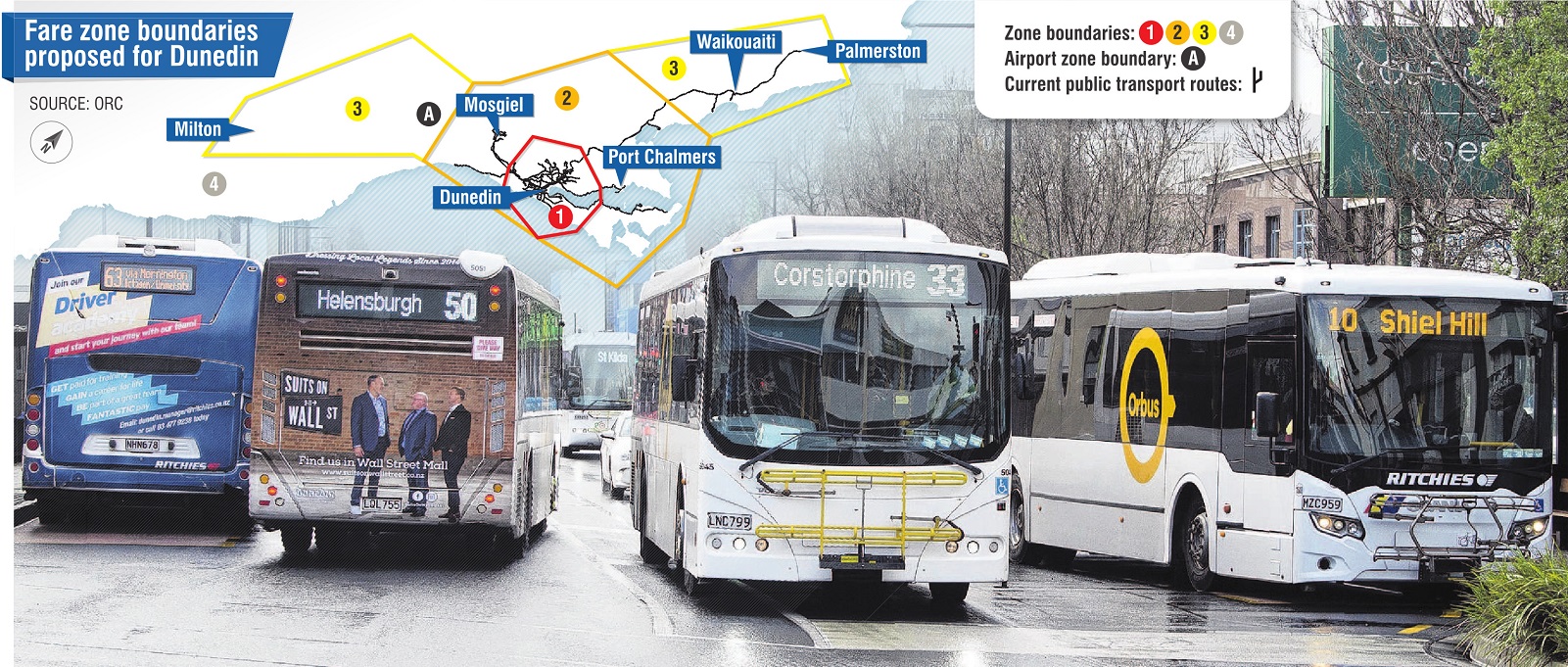
As the Otago Regional Council looks to increase its cost recovery from the region’s buses, fares could increase from $2 to $2.50 for adult users.
Buses themselves could become mobile billboards as the council looks to increase the "private share" of public transport costs in line with central government expectations.
ORC transport planning lead Robyn Hyde, in a report to today’s council meeting, said the Government Policy Statement for Land Transport 2024 called upon public transport authorities to increase private share revenue to offset increasing public transport operating costs.
Last year, the private share of public transport revenue in Otago was about 18.7% and council staff advised NZ Transport Agency Waka Kotahi in December, with councillor approval, the council could reach 20% this year, 25% next year and 30% for 2026-27, Ms Hyde said.
Transport staff believed changing concessions, including ending free rides for passengers aged 5 to 12 years old, was "immediately available" as a way to increase non-government revenue, she said.
The 40% Dunedin youth concession and the 25% Queenstown youth concession could also change.
Increasing the adult fare to $2.50 should be consulted on in the next regional public transport plan, Ms Hyde said.
So too should "possibly changing the fare structure to enable longer distance trips to have higher fares".
"Levers available to increase private share in Otago are limited," she said. "From a revenue perspective, increasing passenger fare revenue is the only immediate lever available.
"Fare revenue can be increased by increasing patronage, increasing the existing flat-fare level, adjusting concessions, or changing the fare structure to enable longer-distance trips to have higher fares (i.e. introducing zones)."
If the council decided it was of a mind to increase the adult fare to $2.50, that move was forecast to increase revenue by $1,590,000 next year.
Moving away from the flat-fare approach to a "zonal fare structure" was also highlighted in the report.
However, further work, which was now under way, was required to fully consider and model the fares for each of the zones, the report said.
Dunedin could move to a three-zone network, which would allow the council to charge more for a trip to Mosgiel or Port Chalmers (Zone 2) or Palmerston (Zone 3), Ms Hyde said.
A fourth zone could be included to represent possible future services to Oamaru or Balclutha, she said.
In Queenstown, a two-zone system could be implemented and those travelling from Queenstown beyond Lake Hayes to Arrowtown would pay more.
A third zone could also be created to allow for future services to Cromwell.
"Both networks would have an additional airport zone," Ms Hyde added.
Additionally, commercial revenue opportunities in Otago included sponsorship of buses or the bus fleet, Ms Hyde said.
Advertising on the back of the bus was already included as a benefit to operators through existing contracts "but the remainder of the bus real estate would be available to sell".
Some companies might consider paying for "free travel days" as a marketing opportunity, she said.
Digital screens in the bus hubs in Queenstown and Dunedin, along with in-vehicle screens, were possible advertising platforms.
While advertising on bus shelters in Dunedin required a resource consent, it could be an option.
There could also be some permitted signage on bus shelters in Queenstown at some stops, depending on their zoning.
Larger public transit authorities elsewhere had already partnered with media companies to manage their advertising spaces "so there are examples in the country that could provide an indication of the potential value in advertising and sponsorship opportunities in Otago", Ms Hyde said.
"Private share and fares in particular are a topic likely to generate considerable interest with the public.
"It will be important to communicate what is a complex topic in a way that is easy to understand and does not lose sight of the community and societal benefits of public transport within the value-for-money analysis."













